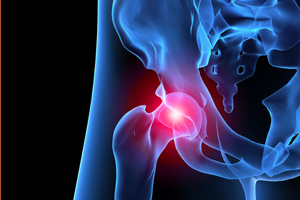
Orthopedic devices giant Stryker (NYSE:SYK) announced recall of a pair of hip implants over concerns that the devices may be prone to "fretting and/or corrosion at or about the modular-neck junction," which may lead to pain, swelling and adverse reactions in surrounding tissue.
The recall affects the company’s Rejuvenate Modular and ABG II modular-neck hip stems, and Stryker decided to terminate global production of the devices after discovering a potential trend in post-market surveillance data.
"While modular-neck stems provide surgeons with an option to correct certain aspects of a patient’s anatomy and hip biomechanics, given the potential risks associated with fretting and corrosion at the modular neck junction, Stryker Orthopaedics decided to take this voluntary action," hip reconstruction vice president and general manager Stuart Simpson said in prepared remarks.
Modular neck stems allow physicians to more accurately reproduce a patient’s natural hip geometry and "can facilitate femoral component insertion in more technically challenging surgical approaches," according to a Stryker report dated 2012.
However, the neck stems have also been associated with sensitivity arising from metal corrosion.
"Stryker Orthopaedics’ decision to voluntarily remove Rejuvenate and ABG II modular-neck stems and terminate global distribution of these products comes after continued post-market surveillance," according to a press release. "The post-market surveillance data may be predictive of a trend."
The company recently released a report considering the ongoing controversy over metal-on-metal hip implants, which sparked regulatory probes and public outcry after Johnson & Johnson (NYSE:JNJ) recalled hip systems made by its DePuy Orthopedics subsidiary over concerns that a higher-than-normal number of patients required surgeries to correct or remove defective implants.
The report outline the benefits of modular neck stems while also considering that, in rare cases, they may exhibit the same issues plaguing metal-on-metal artificial hips.
"In vivo production of metal debris from implants has been the subject of much scrutiny recently. Metal on metal bearings, for example, produce small (20-80nm diameter) metallic wear debris whenever motion is present," the report noted. "Elevated blood serum metal ion levels (it is believed these metal ions are produced by corrosion of the wear debris in the case of metal on metal joints) and metal hypersensitivity resulting in an adverse local tissue reaction may occur with metal-metal articular surface bearings, causing premature failure due to osteolysis, aseptic loosening and in some instances a devastating pseudotumor formation."
"It has been shown that a similar reaction and potentially premature failure of the total hip arthroplasty may occur in rare cases of patients with both modular head and modular-neck femoral components," the report added. "There may be patient specific factors such as local chemistry influenced possibly by underlying infections however, there is little if any strong evidence in the literature. The most important thing to the surgeon and indeed the patient is the swift and unambiguous diagnosis of the cause of pain in a painful total hip arthroplasty so that in the rare cases where fretting and/or corrosion has occurred, there are no delays in providing the appropriate treatments with both modular head and modular-neck femoral components."
It’s not Stryker’s first metal-on-metal hip implant warning. In April the company contra-indicated its Accolade femoral stems against use with Mitch TRH acetabular cups and Mitch TRH modular heads manufactured by DePuy’s Finsbury Orthopaedics unit.
An FDA expert panel last week advised physicians against use of MoM implants, but stopped short of recommending a recall.
SYK shares today slid by 1.2%, at $53.54 apiece, as of the close of the market.

